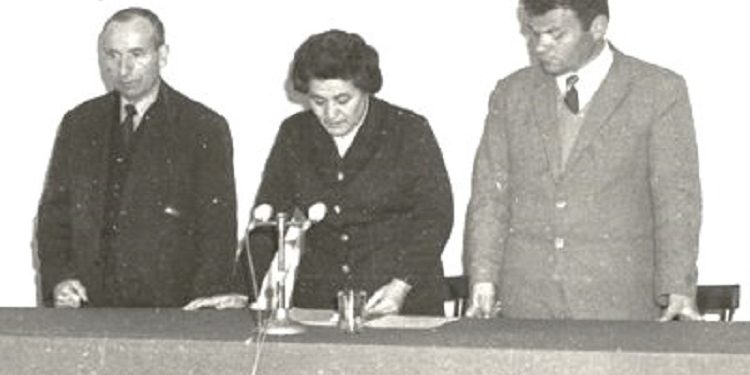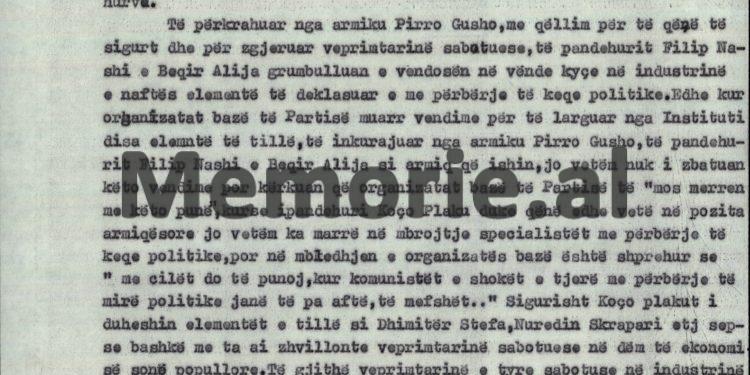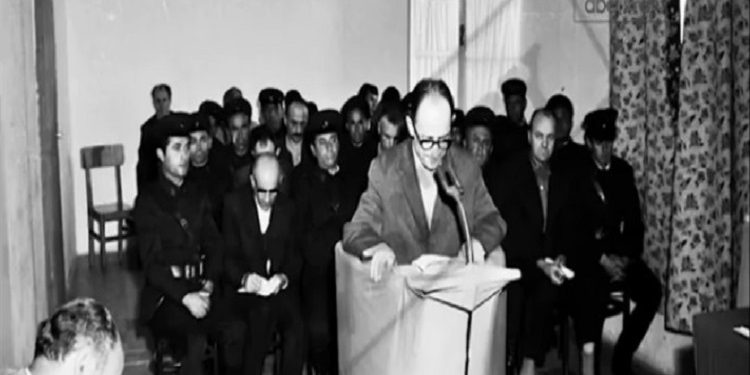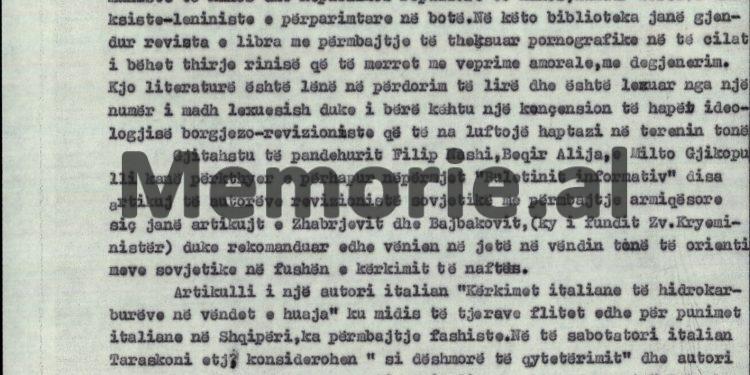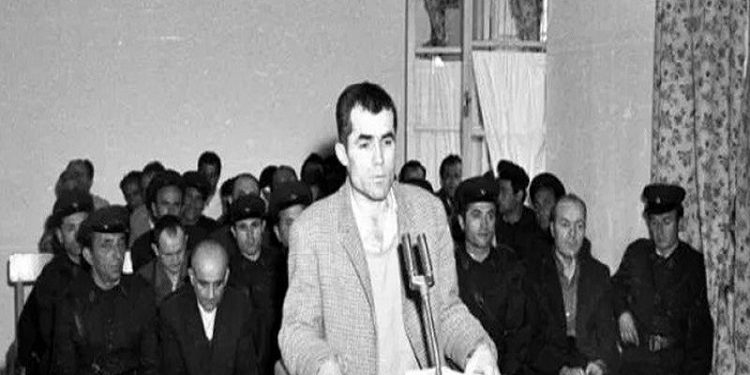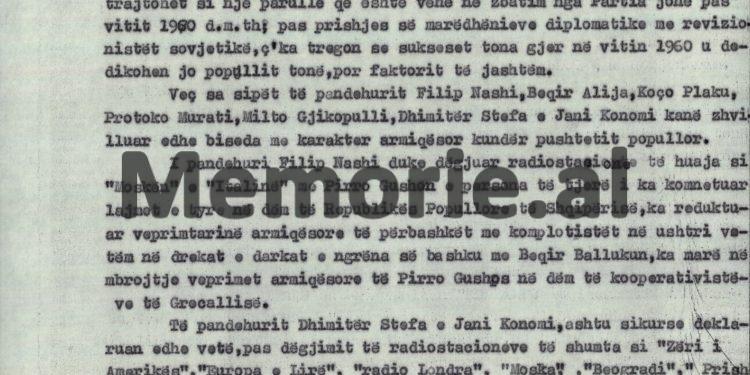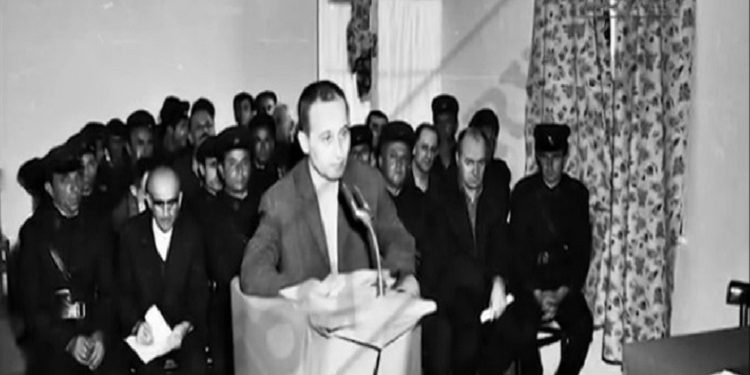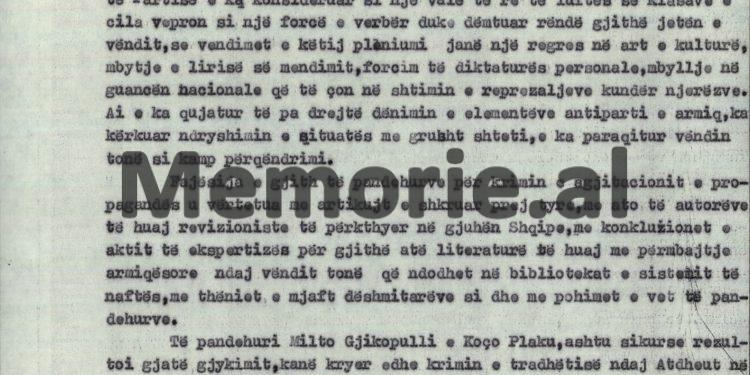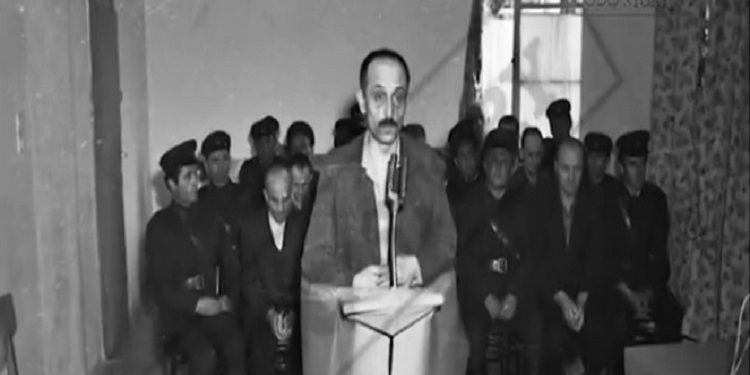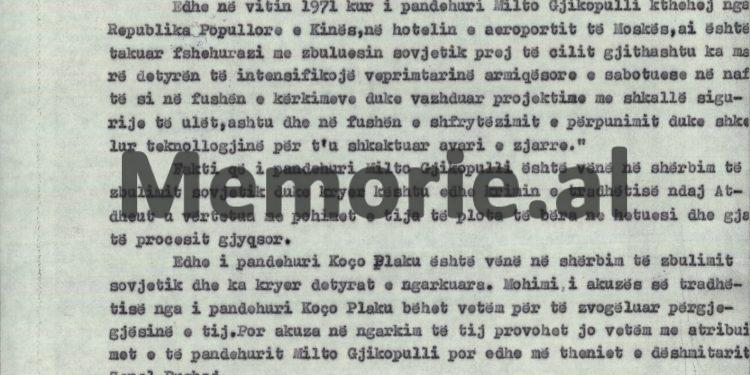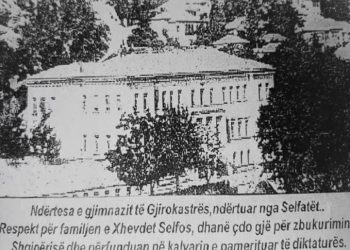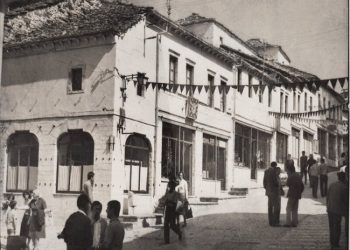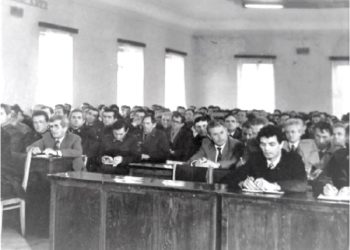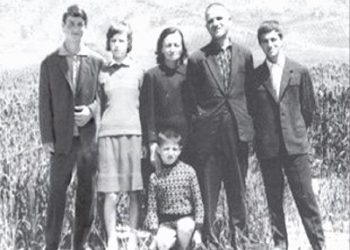By Dashnor Kaloçi
Part Twelve
Memorie.al / From the end of November 1944, when he officially came to power, until his death in 1985, the communist dictator Enver Hoxha, wanting to resemble his idol, Iosif Vissarionovich Stalin, and following his “path,” would occasionally undertake purges in the high leadership of the PPSH (Albanian Party of Labour). He had practically started this since 1941, with Anastas Lula and Sadik Premte, continued with Koçi Xoxe (and his group) in 1948-49, and finished in 1981-82 with the so-called “Hostile Group of Mehmet Shehu and Kadri Hazbiu.” In this time span of more than four decades, as is already known, he eliminated almost all the founders of the Albanian Communist Party, members of the Political Bureau of the Central Committee of the PPSH, and the main leaders of the so-called “National Liberation Anti-Fascist War,” so much so that from 1960 until the collapse of the communist regime in 1990, only Pilo Peristeri had escaped prison or internment, enjoying privileges as a perpetual candidate of the Political Bureau and the function of director of the “Enver Hoxha” Autotractor Combine!
However, unlike what he had done until the early ’70s, where Enver Hoxha’s “sword” had fallen mainly on the high leadership of the PKSH (Albanian Communist Party), (Koçi Xoxe, Kristo Themelko, Sotir Vullkani, Ramadan Çitaku, Tuk Jakova, Bedri Spahiu, Liri Gega, Gjin Marku, Koço Tashko, Liri Belishova, etc.), whom he had accused of “deviating from the Party line” and condemned as “traitors and enemies of the people,” in the mid-’70s, the dictator Enver Hoxha began to strike against some members of the Political Bureau who also held ministerial posts, such as Abdyl Këllezi and Koço Theodhosi, accusing them of being “saboteurs of the Socialist Economy”!
And just as he had done with Beqir Balluku, Petrit Duma, and Hito Çako (who were sentenced to death and executed), where, to prove their “hostile activity,” Enver Hoxha also sentenced a large group of senior officers to prison and internment, with the so-called “Economic Sabotage Group,” which, in addition to Këllezi and Theodhosi, also included the two ministers Kiço Ngjela and Vasil Kati, some senior officials of the Trade sector, well-known directors and specialists such as Andrea Manço, Ahmet Jegeni, Bardhyl Frashëri, etc., as well as the Oil sector, were also accused and convicted, such as; well-known leaders, engineers, and specialists, like; Filip Nashi, Beqir Alija, Koço Plaku, Milto Gjikopulli, Protoko Murati, Dhimitër Stefa, Jani Konomi, Nuredin Skrapari, etc.
As we will see in the documents in question, the investigative process against the so-called “Hostile and Sabotage Group of the Economy,” which had been carried out by the Ministry of Internal Affairs and the State Security, with fabricated accusations and false testimonies or those obtained under torture, etc., was also continued by the Supreme Court of the People’s Republic of Albania, headed by Aranit Çela, “channeling” the accusations from the “legal” side as well, to “prove” what Enver Hoxha had said in the Plenums of the Central Committee of the PPSH against Abdyl Këllezi, Koço Theodhosi, Kiço Ngjela, Vasil Kati, etc.
For all these people, after the ’90s, much has been said and written, by members of those “groups,” their family members, etc., etc. Memorie.al has secured the archival documents of the Supreme Court of the People’s Republic of Albania of that time and the former Presidium of the People’s Assembly, where the “Hostile Group of the Economy,” “Trade,” and “Oil” were reviewed. These documents are being published for the first time, and we are publishing them in several issues, along with the corresponding photos and facsimiles.
In the first and second parts of this series of articles, we are publishing the documents that talk about the former director of Makinaimport, Andrea Manço, originally from the village of Boboshtica in Korça, whose brother, Todo Manço, had served for years as the chief engineer and director of the Bulqiza chromium mine, and also as a member of the People’s Assembly for several legislatures. When he passed away on November 6, 1974, a magnificent funeral ceremony was held for him, with homages in the center of the capital, where in addition to Enver Hoxha, all the high leadership of the PPSH, led by Prime Minister Mehmet Shehu, participated. While all these honors would be given to Todo Manço, (“Hero of Socialist Labour”), his brother, Andrea, almost two years later, would be tortured in the cells of the State Security and sentenced to death, by firing squad, as an “enemy of the people” and “agent of foreign agencies,” and his grave has still not been found!
Continued from the previous issue
DECISION OF THE SUPREME COURT, PRESIDED BY ARANIT ÇELA, SENT TO THE PRESIDIUM OF THE PEOPLE’S ASSEMBLY, REGARDING THE CONVICTION OF THE “HOSTILE GROUP” IN THE OIL SECTOR, LED BY FILIP NASHI, BEQIR ALIJA, KOÇO PLAKU, MILTO GJIKOPULLI, ETC.
REPORT
PEOPLE’S REPUBLIC OF ALBANIA
SUPREME COURT
No. 381
Tirana, June 21, 1976
To the Presidium of the People’s Assembly
Tirana
PEOPLE’S REPUBLIC OF ALBANIA
SUPREME COURT
No. 12, Main Register
No. 13 of the Decision
DECISION
IN THE NAME OF THE PEOPLE
The Supreme Court of the People’s Republic of Albania composed of:
Chair of the session: Eleni Selenica, Deputy Chair of the Supreme Court
Deputy Judge of the session: Mitat Goskova
Deputy Judge of the session: Fehmi Legreta
Assisted by the secretary Sadik Mema, with the participation of Prosecutor Sotiraq Samara, Deputy General Prosecutor, from June 11-17, 1976, reviewed in a closed court session, criminal case No. 12 concerning the defendants:
The defendant Milto Gjikopulli pointed out that he was informed about Koço Plaku’s service to Soviet Intelligence not only by Elvira Babichenko, but also when he met with the Soviet intelligence officer in Moscow in 1971, he wanted to give him a letter for Koço Plaku, but when he learned that Milto had made efforts to connect with Elvira, for security reasons, the Soviet intelligence officer did not give him the letter, emphasizing that he would send it through another channel.
Meanwhile, the witness Zenel Pushaj stated that the defendant Koço Plaku himself told him that the Russians had ordered him to save himself, to wait for orders on how to proceed, that a person would come and tell him; “You have greetings from your uncle,” this work will not last many years, we need you in the future, if you see that others are sabotaging, do not raise the alarm, present yourself as an enemy of the Soviet Union, etc.” The person who made contact with the defendant Koço Plaku, as he himself stated to the witness Zenel Pushaj, was the Soviet intelligence officer “Kozorjev,” who came as a “specialist” in the Oil and Gas industry.
The defendant Koço Plaku’s claim that he told the witness these facts but was in “difficult” circumstances is not substantiated. The defendant Koço Plaku had various conversations with the witness Zenel Pushaj, talking at length about his family members, his views, and the sabotages carried out in the oil sector by him and others, which he does not deny. Therefore, there is no reason not to believe the statements of the witness Zenel Pushaj, who heard all the information he gives from the defendant himself and not through any other person.
During the trial of the case, it was proven that the defendants Filip Nashi and Beqir Alija, by exploiting the leading positions they held in the General Directorate of Oil and the Institute, abused their official position, causing damage with particularly serious consequences. Acting in violation of the proper fulfillment of their duty, in contradiction with the laws and rules of monetary and material value management, they distributed numerous machinery and equipment outside the oil system to various enterprises, agricultural cooperatives, military units, and institutions.
Thus, the defendant Filip Nashi distributed 20 cars, 7 trucks, 105 projectors, 40 electric motors, 3 moto-generators, medical equipment, 60 amplifiers, 20 stabilizers, over 200 complete car tires, various quantities of block aluminum, block bronze, steel, various acids, coke coal, typewriters, etc. This defendant, having a free hand in managing the colossal funds allocated by the Government for the oil industry, manipulated them as he wished, behaving with the people’s property as an enemy.
The defendant Beqir Alija also ordered and allowed the distribution of materials and equipment worth 384,800 lek to military units, agricultural cooperatives, and various institutions outside the oil system. The total value of the materials and equipment distributed according to the expert report amounts to 6,329,200 lek. The guilt of the defendants for the crime of abuse of official position was proven by the statements of witnesses, written evidence, the expert report, and their own confessions.
Ultimately, the court reaches the conclusion that the hostile-sabotage activity of all the defendants has extended to all sectors of Oil and Gas, that it has severely damaged the socialist economy and the country’s defense capability. It has ultimately aimed at overthrowing the people’s power and as such represents a great social danger. The Court, in determining the social danger of the defendants, takes into account the fact that the work of the enemy element, which had taken a place at the head of the State Planning Commission and the Ministry of Industry and Mines, played an important role in its instigation, extent, and intensity.
The Court also; in determining the social danger of each defendant for the crime of sabotage, takes into account the fact that the sabotage activity of the defendants Koço Plaku and Milto Gjikopulli is an inseparable part of their activity as agents of the Soviet revisionists. Therefore, in determining the measure of punishment, the court takes into account the above as well as the personality of each defendant, the role he played in all this hostile and sabotage activity, and the degree of guilt.
FOR THESE REASONS
The Supreme Court based on articles 278 and 279 of the Criminal Procedure Code of the People’s Republic of Albania.
DECIDED
To declare the defendants Filip Nashi, Beqir Alija, Milto Gjikopulli, Koço Plaku, Protoko Murati, Dhimitër Stefa, Jani Konomi, and Nuredin Skrapari guilty of the crime of sabotage provided for by article 72 in conjunction with article 12 of the Criminal Code of the People’s Republic of Albania. To declare the defendants Milto Gjikopulli and Koço Plaku guilty of the crime of treason against the Homeland provided for by article 64 of the Criminal Code of the People’s Republic of Albania.
To declare the defendants Filip Nashi, Beqir Alija, Milto Gjikopulli, Koço Plaku, Protoko Murati, Dhimitër Stefa, and Jani Konomi guilty of the crime of agitation and propaganda against the people’s power, provided for by the first paragraph of article 75, in conjunction with article 12 of the Criminal Code of the People’s Republic of Albania. To declare the defendants Filip Nashi and Beqir Alija guilty of the crime of abuse of official position provided for by the second paragraph of article 199 of the Criminal Code of the People’s Republic of Albania.
Based on the above provisions, the court sentences the defendants:
- Filip Apostol Nashi
a) Based on article 72, in combination with article 12 of the Criminal Code, to 25 years of imprisonment and confiscation of his property. Based on article 28 of the Criminal Code, to the loss of electoral rights for 5 years and based on article 29 of the Criminal Code, to the revocation of all titles and decorations he holds.
b) Based on article 73/I, in combination with article 12 of the Criminal Code, to 10 years of imprisonment and confiscation of his property. Based on article 28 of the Criminal Code, to the loss of electoral rights for 5 years and based on article 29 of the Criminal Code, to the revocation of all titles and decorations he holds.
c) Based on the second paragraph of article 199 of the Criminal Code, to 8 years of imprisonment.
Finally, based on article 48 of the Criminal Code, by combining the sentences, he is sentenced to 25 years of imprisonment, confiscation of his property, loss of electoral rights for 5 years, and the revocation of all titles and decorations he holds, with the sentence starting from the date of arrest, March 25, 1975.
- Beqir Ali Alija
a) Based on article 72, in combination with article 12 of the Criminal Code, he is sentenced to 25 years of imprisonment and confiscation of his property. Based on article 28 of the Criminal Code, to the loss of electoral rights for 5 years and based on article 29 of the Criminal Code, to the revocation of all titles and decorations he holds.
b) Based on the first paragraph of article 73, in conjunction with article 12 of the Criminal Code, to 10 years of imprisonment and confiscation of his property. Based on article 28 of the Criminal Code, to the loss of electoral rights for 5 years and based on article 29 of the Criminal Code, to the revocation of all titles and decorations he holds.
c) Based on the second paragraph of article 199 of the Criminal Code, to 6 years of imprisonment.
Finally, based on article 48 of the Criminal Code, by combining the sentences, he is sentenced to 25 years of imprisonment, confiscation of his property, loss of electoral rights for 5 years, and the revocation of all titles and decorations he holds, with the sentence starting from the date of arrest, March 25, 1975.
- Koço Josif Plaku
a) Based on article 64 of the Criminal Code, he is sentenced to death by firing squad and confiscation of his property. Based on article 28 of the Criminal Code, to the loss of electoral rights for 5 years and based on article 29 of the Criminal Code, to the revocation of all titles and decorations he holds.
b) Based on article 72 in combination with article 12 of the Criminal Code, to 25 years of imprisonment and confiscation of his property. Based on article 28 of the Criminal Code, to the loss of electoral rights for 5 years and based on article 29 of the Criminal Code, to the revocation of all titles and decorations he holds.
c) Based on the first paragraph of article 73, in conjunction with article 12 of the Criminal Code, to 10 years of imprisonment and confiscation of his property. Based on article 28 of the Criminal Code, to the loss of electoral rights for 5 years and based on article 29 of the Criminal Code, to the revocation of all titles and decorations he holds.
Finally, based on article 48 of the Criminal Code, by combining the sentences, he is sentenced to death by firing squad, confiscation of his property, loss of electoral rights for 5 years, and the revocation of all titles and decorations he holds.
- Milto Vasil Gjikopulli
a) Based on article 64 of the Criminal Code, he is sentenced to death by firing squad and confiscation of his property. Based on article 28 of the Criminal Code, to the loss of electoral rights for 5 years and based on article 29 of the Criminal Code, to the revocation of all titles and decorations he holds.
b) Based on article 72, in combination with article 12 of the Criminal Code, to 25 years of imprisonment and confiscation of his property. Based on article 28 of the Criminal Code, to the loss of electoral rights for 5 years and based on article 29 of the Criminal Code, to the revocation of all titles and decorations he holds.
c) Based on article 23/I, in combination with article 12 of the Criminal Code, to 10 years of imprisonment and confiscation of his property. Based on article 28 of the Criminal Code, to the loss of electoral rights for 5 years and based on article 29 of the Criminal Code, to the revocation of all titles and decorations he holds.
Finally, based on article 48 of the Criminal Code, by combining the sentences, he is sentenced to death by firing squad, confiscation of his property, loss of electoral rights for 5 years, and the revocation of all titles and decorations he holds.
- Protoko Avni Murati
a) Based on article 72 in combination with article 12 of the Criminal Code, he is sentenced to 23 years of imprisonment and confiscation of his property. Based on article 28 of the Criminal Code, to the loss of electoral rights for 5 years and based on article 29 of the Criminal Code, to the revocation of all titles and decorations he holds.
b) Based on the first paragraph of article 73, in combination with article 12 of the Criminal Code, to 10 years of imprisonment and confiscation of his property. Based on article 28 of the Criminal Code, to the loss of electoral rights for 5 years and based on article 29 of the Criminal Code, to the revocation of all titles and decorations he holds.
Finally, based on article 48 of the Criminal Code, by combining the sentences, he is sentenced to 23 years of imprisonment, confiscation of his property, loss of electoral rights for 5 years, and the revocation of all titles and decorations he holds, with the sentence starting from the date of arrest, March 25, 1975. / Memorie.al




